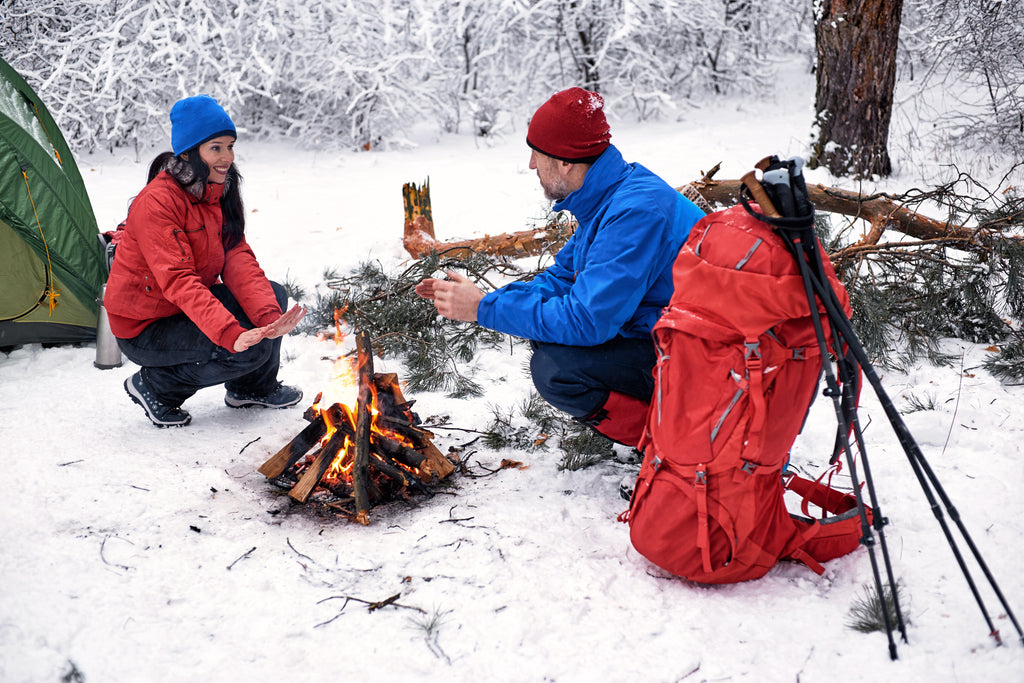Winter Camping 101: Everything You Need To Camp In the Snow

Is there anything quite like camping? The scenery, the solitude, the tranquility, camping can give us a fantastic opportunity to unwind, recharge, and reconnect with nature. Camping, especially coupled with backpacking to your campsite, is terrific exercise for your body. It’s good for your mind too. Studies show that time spent in nature can help improve our mood, ease stress, and even decrease symptoms of depression. If sleeping under the stars is old hat for you, and you’re ready to try something new, or you find that crowded summer campgrounds aren’t your vibe, one great alternative is to save your camping trip for when temperatures drop. Winter camping might seem like a scary undertaking at first, but with the right planning and preparation, cold weather camping can be an incredible outdoor experience.
Benefits of Winter Camping
What comes to mind when you think about winter camping? The cold temperatures? The wet snow? You might be thinking to yourself, why would anyone go camping in the winter? If this sounds like you, you might be surprised to hear that many people prefer winter camping. Here are a few of the benefits of camping in the snow:
- No Crowds
Fewer people hike and camp in the winter. Winter camping means more solitude and fewer strangers to interfere with your communing with nature. With fewer people out, you can have your pick of almost any campsite instead of having to arrive early and claim your spot. Whether your preferred trail has designated sites, shelters, or stealth spots, you can have the best of the best all to yourself.
- Quiet
Have you ever been sleeping peacefully in your tent only to be awoken by noisy neighbors? As you might imagine, winter camping with fewer people around means that your camping experience is much quieter. Early risers can sleep early, and night owls can sleep in without the risk of other people disturbing their serene camping slumber.
- More Wildlife
As you can imagine, with fewer people and a quieter atmosphere, you’re much more likely to see wildlife around. Many animals are more active in the winter and tend to hang out at lower elevations. Plus, the lack of foliage and contrasting snow makes seeing critters a breeze, so if wildlife viewing is up your alley, consider going camping in the winter.
- No Bugs
Probably the ultimate benefit of winter camping is no bugs! While warm-weather camping means battling mosquitoes, no-see-ums, and all manner of other creepy-crawlies, camping in the snow means absolutely no bugs.
Winter Camping 101
Winter camping is a unique experience and, once mastered, means you can backpack, hike, and camp at almost any time of year. That being said, it isn’t wise to tackle winter camping without plenty of planning and preparation.
Planning Ahead For Winter Camping

Like any outdoor activity, winter camping is not without risks. Our job is to mitigate those risks as much as possible, and one of the best ways to do this is to plan ahead. For your first few winter camping trips, plan on bringing someone else along, preferably someone with experience camping in the snow.
- Choose Your Destination
Whether you plan on hiking, skiing, driving, etc., to your campsite, choose your destination ahead of time. Consider first whether or not your destination is even open in the winter. For your first cold-weather camping experience, set yourself up for success: choose somewhere relatively easy to access and easy to leave should you need to bail. Familiarize yourself with the resources available at the campsite and plan accordingly. For example, will there be running water nearby, or will you need to boil snow? Is there wood for a campfire? Is there shelter available, or do you need to bring your own?
- Check the Weather
You’re already dealing with snow and cold temperatures; the last thing you want to do is run into a storm. Make sure you check the forecast before you go camping. If it looks like you might run into some unpleasant weather, postpone your trip for another time.
- Leave Your Plan with Someone
Before you go camping, make sure someone knows where you are going, when you’re going, and when you plan to be back. That way, if they don’t hear from you, this person can alert the appropriate authorities to your location and that you might need help.
Packing the Essentials For Camping In the Snow

Packing the right gear is just as essential to winter camping as planning your trip. It might be even more critical. A lack of preparation for winter camping can lead to a miserable time, but you can enjoy your trip without worry with the proper gear. Here is a brief overview of what you need to pack. Find a more extensive winter camping checklist here.
- Sleep System and Shelter
Trust us when we say that you will have a terrible night if you don’t have an adequate sleep system for winter camping. Your sleep system includes, at minimum, a bag and pad. Make sure your sleeping bag is rated for the low nightly temperatures you can expect while camping. If you need a little extra warmth, consider adding a sleeping bag liner. Your sleeping pad should have an insulation rating (“R-rating”) of at least 3, but 5 or higher is preferable. If shelter isn’t available at your destination, your regular 3-season tent should work just fine. You only need a 4-season tent if you think you’ll run into high winds or heavy snow.
- Camp Stove
To cook your meals and make hot drinks you are going to want to bring your camp stove. Whatever camp stove you use during mild weather camping will work just fine in winter too. Pack plenty of fuel so you can drink hot tea to your heart’s content. The idea and aesthetic of cooking over a campfire might tempt you to leave your stove at home, but in reality, most winter conditions aren’t conducive to making campfires. At the very least, you can attempt to make a fire but bring your stove just in case your efforts prove fruitless.
- Food and Drinks
Hot food and drinks can warm you up and even significantly boost your mood when winter camping. You can plan easy camping meals or bring ready-made meals that only require hot water. Hot drinks like tea, coffee, and hot chocolate are basically a requirement for camping in the snow.
- Clothing
Clothing is arguably just as important as your sleep system. While you want to stay warm, you also want to avoid sweating. Finding just the right balance is paramount to your happiness and well-being while winter camping.
- Base Layer: For winter camping clothing, think layers. Your base layer, the one against your skin, should be comfortable and light, a synthetic or merino wool fabric (never cotton, ever) that wicks sweat and dries quickly. Merino wool fabric tends to be more expensive but lasts longer and is more effective than synthetic fibers at regulating your body temperature and wicking sweat. As a bonus, merino wool expels odors from the body too, which can come in handy when camping means you haven’t showered in several days. For cold-weather camping, look for either a 150 to 250 weight base layer, depending on the temperature and your personal preference.
- Mid Layer: Your mid-layer is responsible for trapping your body heat. Most mid-layers are insulating jackets made of materials like fleece, down, or wool.
- Outer Layer: Your shell layer is responsible for keeping you safe from the elements. This jacket needs to insulate but, more importantly, keep you dry. If there’s one thing worse than being cold, it’s being wet and cold.
You need gloves, a hat, and a few pairs of thick socks in addition to your layers. You might consider merino wool socks to stay extra warm.



